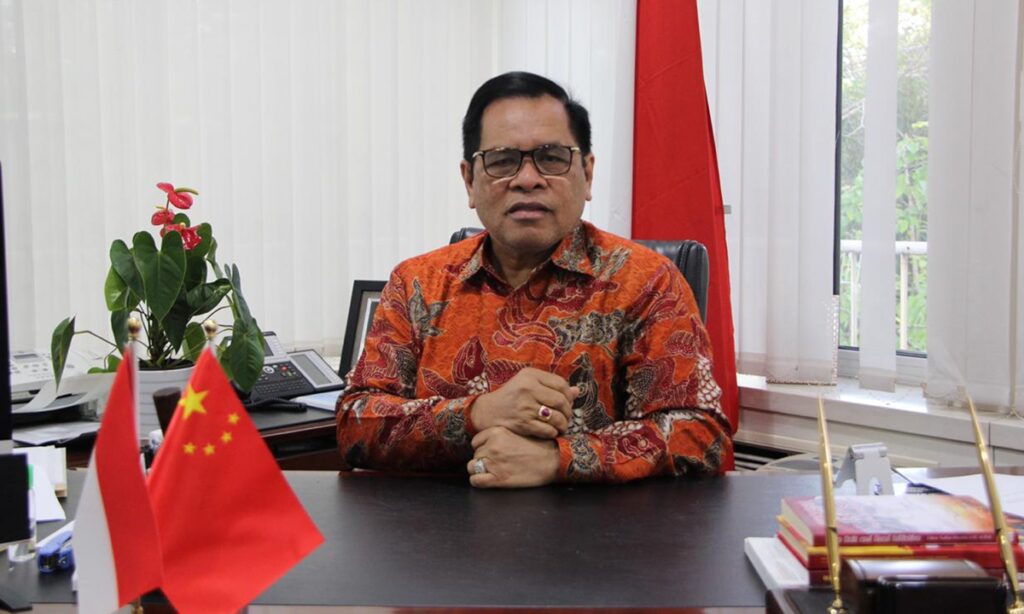Editor Note:
China stands ready to strengthen strategic communication across all levels in the post-COVID-19 era with Indonesia to inject positive energy into regional and world peace, stability and development, Chinese State Councilor and Foreign Minister Wang Yi said during his latest visit to Indonesia. Indonesian Ambassador to China Djauhari Oratmangun (Oratmangun) pinned hopes on Chinese-developed COVID-19 vaccines in a latest exclusive interview with the Global Times reporter Hu Yuwei (GT). He reiterated Indonesia’s efforts to work with China in maintaining peace and security in the South China Sea and bridging the two countries’ connectivity investment programs.
GT: Indonesia gave China’s Sinovac COVID-19 vaccine its first emergency use approval outside of China on Jan 11. What are the reasons behind your trust in the safety and efficacy of Chinese-developed vaccines? Do you expect further vaccine cooperation?
Oratmangun: Indonesia’s trust and confidence in Sinovac’s vaccine is reflected in Indonesian President Joko Widodo being the first to receive a shot. We share President Widodo’s sentiments.
Now Indonesia has already begun the vaccinations, thanks to the good collaboration between Indonesia and China. The vaccine collaboration between Indonesia’s Bio Farma and China’s Sinovac will make Indonesia the hub of vaccine manufacturing in the Southeast Asia region.
Last year, the Coordinating Minister for Maritime and Investment Affairs of Indonesia, in the capacity as the special envoy of President Widodo, as well as Indonesian Minister for Foreign Affairs and Indonesian Minister for State-Owned Enterprises, visited China and met State Councilor and Foreign Minister Wang Yi to discuss the development of bilateral relations between the two countries, particularly the issue of vaccine cooperation.
Both countries realize that in 2021 the world is still facing the COVID-19 pandemic that has already had a severe impact on the global economy. In this sense, Indonesia and China will focus their cooperation on economic and health issues, particularly on vaccine, medical equipment and medicines.
Due to the limited capacity of vaccine supply, Indonesia and China will work together to provide vaccine as a public good and support public health not only domestically, but also in the region.
GT: How do you view the significance of Wang’s visit?
Oratmangun: Indonesia and China are commemorating the 70th anniversary of the establishment of diplomatic relations and fifth anniversary of the Comprehensive Strategic Partnership. A number of collaborative activities have been conducted and scheduled, including visits by leaders of both countries. The visit by State Councilor and Foreign Minister Wang Yi to Indonesia was scheduled in early 2020. However, due to the COVID-19 pandemic, the visit was cancelled.
Wang’s visit to Indonesia was organized under the framework of the commemoration of the 70th anniversary of diplomatic relations and was intended to re-state Chinese government’s support on vaccine collaboration between the two countries, as well as to discuss the progress and pending matters of bilateral cooperation and to review the Plan of Action for the Implementation of the Comprehensive Strategic Partnership between the two sides.
Indonesia and China have also agreed to deepen cooperation in other areas such as infrastructure cooperation under the framework of China’s Belt and Road Initiative (BRI) and Indonesia’s Global Maritime Fulcrum (GMF), financial cooperation, digital economy, technology innovation, maritime cooperation, and the protection of Indonesian seafarer.
Indonesia believes that the key to bilateral economic cooperation is to synergize the needs of both countries and establish mutually beneficial cooperation. Indonesia and China will intensify the trade cooperation. China is also committed to increasing its imports of Indonesian products to balance the trade with Indonesia.
GT: In the first nine months of 2020, China’s overall investment in Indonesia bucked the trend and surged 79 percent, and China remains Indonesia’s second-largest investor. China has been Indonesia’s largest trading partner and main source of foreign tourists. In what ways do you think Indonesia can become more attractive to Chinese investors?
Oratmangun: Indonesia is attractive for Chinese investors as it has succeeded in synergizing China’s BRI and Indonesia’s GMF, a connectivity concept aiming to connect Indonesia with all countries and regions around the globe through mutual cooperation and exchanges. With the synergy, both countries have agreed to intensify their collaboration and produce abundant joint cooperation in various fields, especially in trade and investment.
On top of that, in order to streamline business process and attract more investors, in 2020, Indonesian government has stipulated a new law called “Omnibus Law.” The law mainly aims to revise several prevailing laws to settle fundamental issues that are curtailing business environment competitiveness in Indonesia.
With this, investors will enjoy a number of benefits, such as more business certainty, streamlined regulations, fiscal incentives, and non-fiscal relief such as ease of licensing and easier access to investment locations or sites.
Investment in digital economy is also welcome. With the great growth potential of Indonesia, the two sides have established a wide-ranging cooperation in the sector, such as jointly developing blockchain technology, cloud computing, big data, internet of things, artificial intelligence, cashless payment, ecommerce and internet infrastructure, and building a center for IT R&D in Kura-kura Island, Bali, and a vocational school for IT.
In this regard, Indonesia has established cooperation with outstanding digital platforms in China such as ByteDance, Meituan Inc, Alibaba’s Ant Financial, Jumore, and JD.com.
GT: China recently signed a three-year coal supply deal with Indonesia to import about $1.5 billion worth of Indonesian coal. Coal is an important commodity in bilateral trade between China and Indonesia. Between 2015 and 2019, China’s coal imports from Indonesia rose from 73 million tons to 138 million tons, an increase of nearly 90 percent. How do you see future cooperation between the two countries in the coal sector?
Oratmangun: In the beginning of 2021, Indonesian Ministry of Energy and Mineral Resources set a target to export a total of 412.5 million tons of coal. This amount is 35 percent higher compared to total coal exports in 2020, which stood at 305.77 million tons.
China has been the biggest importer of Indonesian coal for five years in a row. According to the ministry, China’s imports of Indonesian coal have grown on average 13 percent per year. This is an amazing number. And I also would like to share that the ministry has a target of exporting 200 million tons of coal to China in 2021.
In this regard, I can see a bright future ahead in the coal sector cooperation and will work hard with all relevant stakeholders and parties to realize the target.
GT: Can China and Indonesia work more closely to protect regional and maritime peace and security?
Oratmangun: In terms of security and stability in the region, Indonesia seeks China’s support to the concept and implementation of the ASEAN Outlook on Indo-Pacific and peace and stability in the South China Sea. We will work hand in hand to maintain and promote multilateralism.
China and Indonesia have shared extensive interests in regional and multilateral arenas. As important partners in maintaining regional peace and stability, promoting world prosperity and development, advancing South-South cooperation, and addressing global issues, the two countries shall continue to strengthen strategic communication and coordination.
Indonesia and China are comprehensive strategic partners. Since the establishment of the partnership, the two countries have deepened political mutual trust, reaped rich fruits in practical cooperation, and strengthened people-to-people and cultural exchanges.
The continuous deepening of China-Indonesia relations serves the common interests of the peoples of the two countries, and greatly contributes to regional peace and stability and world development and prosperity.
The two sides have already made joint efforts to highlight the distinctive features of the comprehensive strategic partnership, namely sovereign equality, mutual respect, mutual trust, mutual benefit, reciprocity, and unity and coordination in the new era.
To some extent, such a partnership may be sought after by other ASEAN countries. Nonetheless, the principle of mutually beneficial cooperation should be nurtured and developed in bringing prosperity and stability between the two sides in order to create a fair and sustainable relationship despite many global challenges ahead. A friend in need is a friend indeed.
GT: What opportunities and challenges do you see in the development of bilateral relations?
Oratmangun: The Indonesia-China cooperation in 2021 will focus on the realization of various international commitments after the signing of agreements such as the RCEP, which will certainly speed up domestic and global economic recovery, health cooperation in the field of medicines and vaccines, green cooperation and sustainable development, and promote the spirit of inclusivity, openness, transparency and multilateralism.
The only challenge ahead is the common challenge of facing the pandemic as well as ensuring socio-economic recovery. We may have different perspectives on certain issues, but the key point is to always open up communication in order to keep the tensions low and to deter public sentiments and noises that may affect smooth processes in strategic cooperation and ongoing joint efforts between two countries.
Sidebar:
During Wang Yi’s visit, China and Indonesia have signed four MoUs:
1. MoU on “Two Countries, Twin Parks Cooperation Project” between the Coordinating Ministry for Maritime and Investments Affairs of Indonesia and China’s Ministry of Commerce and Fujian Government
2. MoU on Cooperation in Developing Cyber Security Capacity and Technology between Indonesia National Cyber and Crypto Agency and Cyberspace Administration of China
3. MoU on the Enhancement of Collaborative Activities between Indonesian Ministry of Foreign Affairs and China’s Ministry of Foreign Affairs
4. MoU on Pre-Feasibility Study for Lambakan Dam Project in Indonesia between Indonesian Ministry of Public Works and Housing and China International Development Cooperation Agency
Indonesian Ambassador to China Djauhari Oratmangun Photo: Courtesy of Indonesian Embassy in China



